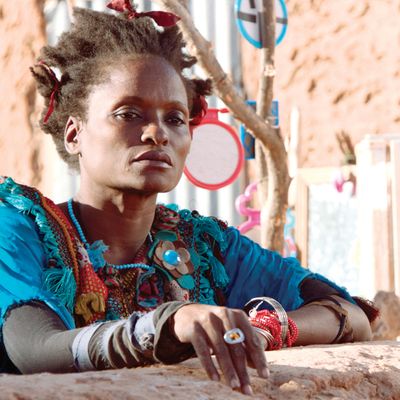
In our Western-imperialist culture, ÔÇ£TimbuktuÔÇØ is slang for the outer fringe of East Bumfuck, but itÔÇÖs the center of the world in Abderrahmane SissakoÔÇÖs shattering Timbuktu ÔÇö a center that cannot hold. The city is on the edge of the Sahara Desert in Mali with one foot in Islamic culture and the other in West African, and so the film has the rare distinction of being in six different languages: French, Arabic, Bambara, Songhay, Tamasheq, and English (the last employed in desperation when a characterÔÇÖs Arabic is too lousy to be understood). With all its colliding tongues and mores, the region is the perfect setting for farce ÔÇö but in this case, tragic farce. ThereÔÇÖs always tragedy when people have guns and are righteous about using them.
Sissako has set Timbuktu during the 2012 takeover of the city by religious jihadists, who announce via megaphone that Sharia is now in effect. That means public lashings for playing music. Or playing soccer. Or playing around. Or just, it seems, playing. Women accustomed to the colors (and plumes) of West Africa must cover every inch of flesh ÔÇö which doesnÔÇÖt sit well with a voluble fish seller, who throws a tantrum over having to wear gloves and is hauled away. (ThatÔÇÖs nothing: Sarah Birke reports in the New York Review of Books that ISIS ┬árequires female surgeons to wear the full niqab and black gloves.) Some of the filmÔÇÖs jihadist soldiers are green and look confused by the disrespect and defiance. They donÔÇÖt quite know what to do when a Muslim elder asks them to leave a mosque so that he and others can ÔÇ£pray in peace.ÔÇØ ItÔÇÖs clear that, without force, jihad just wonÔÇÖt take in Timbuktu.
You can intuit from the opening ÔÇö Islamic soldiers firing from a jeep at a young gazelle ÔÇö that there will be force and that it will be terrible. Sissako, who lives in nearby Mauritania, was reportedly moved to make Timbuktu by news of a Mali couple buried side by side to their necks and stoned to death for the crime of having sex outside marriage. He doesnÔÇÖt put that couple at the center of the film, though ÔÇö it would make for too conventional a tragedy. His protagonists are Kidane (Ibrahim Ahmed) and Satima (Toulou Kiki), who live in a tent on a sand dune outside the city with their daughter and an orphaned boy, raising cows. Their neighbors either fled or died when the jihadists arrived, but Kidane wonÔÇÖt budge. Under a desert moon, he strums his guitar, cuddles his wife, and arrogantly maintains that the danger will pass. HeÔÇÖs tired of running away, tired of humiliation.
For a film that makes you sick with dread, Timbuktu has a light, at times glancing touch. SissakoÔÇÖs frames are open, uninsistent, and he even shows some sympathy for his villains, who are severe but not sadistic. Early on, you might think (or hope) the film will go in a different, more satirical direction. Jihadists fumble a propaganda video featuring a young recruit ÔÇö ÔÇ£I used to make music, rap music; in other words, living in sinÔÇØ ÔÇö whoÔÇÖs stumped when asked to name the injustices that drove him to jihad. An eccentric diva in resplendent colors sashays down the main street ÔÇö her long train dragging in the dirt ÔÇö and blocks a convoy of jihadists, her arms spread wide as if casting a spell. The soldiersÔÇÖ faces carry the expression we know universally as WTF. Even the grim Sharia hearings have a dash of comedy: French must be translated into Arabic, Arabic into Bambara, Bambara into Arabic and French. Clerics are often on the verge of rolling their eyes in impatience.
The film briefly seems like an old-fashioned melodrama whenever a certain jihadist official (a local who joined the occupiers) drives out to offer his services to Satima (the subtext: I must have her!), but first blood comes from a place you donÔÇÖt expect for reasons that have no direct connection to the jihadist reign of fear. In the real, non-melodramatic world, oppressed men tend to focus their rage at being emasculated on one another instead of their oppressors. The killing when it comes is nonsensical in its swiftness, horrific in its consequences. The wide, distant shot of one man stumbling and splashing across the shallow Niger River while a second, mortally wounded, drags himself in the opposite direction toward a dock ÔÇö falling, lurching forward, falling again, the water turning brown around him ÔÇö is among the most grotesquely poetic depictions of violenceÔÇÖs aftermath IÔÇÖve seen. The men are rendered puny by the landscape but as the shot goes on ÔÇö it has the effect of slow motion ÔÇö their agony is magnified.
The climax is confusingly staged and the finale ÔÇö which takes a hairpin turn into metaphor ÔÇö abrupt, but by then the film has so much momentum that Sissako puts it over. If Timbuktu has a ÔÇ£takeaway,ÔÇØ itÔÇÖs a deeply humanist one and so, in this context, political: that thereÔÇÖs no such thing as a monolithic Muslim culture; that the threat is nowhere near as great to Westerners as to the people of Mali, Syria, Iraq, Yemen, etc.; that ideology is deaf and blind and anti-life; and that cinema (and all art) can blow it to what IÔÇÖd once have called Timbuktu.
*This article appears in the January 26, 2015 issue of New York Magazine.


